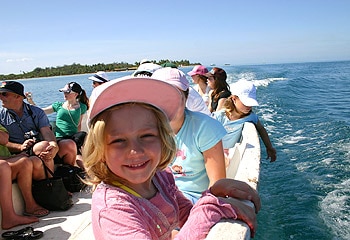A quiet coup in paradise
WHAT do you do when there's a military coup in the tropical paradise you've picked out for the family holiday? Trevor Seymour found out with surprising results.

AS timing goes, ours was impeccable. After one of the most slow-burning coups in history, we arrived in Fiji on December 5 – the very day the military finally chose to take control of the country.
When we boarded the Air Pacific flight in Sydney, the democratically elected government of Prime Minister Laisenia Qarase was still officially in command; when we stepped off four hours later, Commodore Frank Bainimarama was running Fiji.
In the lead-up to our holiday, the Australian TV news had shown images of heavily armed soldiers in the capital Suva, but when we arrived there was no sign of the military in the big tourist hub of Nadi.
It was business as usual at the airport, at the hotel and in town – except, as we quickly discovered, there was much less business than usual for local tourist operators. The coup had already dealt a huge blow to the Fijian tourism industry as thousands of people cancelled their trips.
Cancelling had crossed our minds, as the last thing my wife and I wanted to do was place our lives, and those of our two small children, in any danger.
Deciding to travel was a difficult decision, especially as the Department of Foreign Affairs and Trade's travel warning had reached level four, advising people to "reconsider your need to travel''.
However after talking with our travel agent, monitoring the local Fijian news and discussing the situation with people who had been in Fiji during previous coups, we decided the risk was tiny.
Besides, we were going nowhere near the capital Suva.
Added to this was the fact both our travel agent and insurance company said we would be able to claim only a small amount of the thousands we had pre-paid if we cancelled.
As it turned out, we were very glad we went, as the next two weeks were one of the best family holidays we've had.
From Nadi we took a catamaran to Plantation Island Resort, about 15km offshore on Malolo LaiLai Island, one of the biggest islands in the Mamanuca Group.
Plantation Island is aimed at families, rather than honeymooners or wealthy older people looking for some quiet downtime. Ditto young singles looking for a wild nightlife.
Classed as a three-star resort, Plantation Island is anything but flash, and some of the older style bures are a little run down. But there is a great deal of renovation work going on, and some of the newer garden rooms built in a block of four are top notch for the price.
The beach, on the other hand, is five-star. It is exactly like the pictures of paradise we have all seen: soft white sand, palm trees with hammocks strung between them, and warm, fish-filled water.
Plantation Island is easily capable of housing hundreds of guests, but when we visited was running at around 30 per cent capacity because of the coup.
This meant no problem finding an empty hammock to laze in, a near-deserted beach to walk on, or a table to dine at by the water's edge.
As at most Fijian resorts, there are plenty of water sports on offer. Some are free, such as snorkelling trips to the outer reefs; other activities such as parasailing, fish viewing in the semi-submersible, diving and visits to a nearby shell village are all reasonably priced.
The only sign that anything was amiss was the distinct lack of crowds. While this was good for us, hotels had to lay off staff during the normally busy holiday period.
In the last month, the political situation has settled considerably, with the Australian Government reducing its travel warning for Fiji (except for Suva) to Level Three's "high degree of caution''.
Fiji has launched a major advertising campaign to encourage visitors to return, and many resorts are offering discounts of up to 40 per cent.
The decision is up to you: read the warnings, monitor the news and ask questions.
The coup has done considerable damage to Fiji's reputation as a democratic country and badly hurt its tourism industry. This is a real shame, as the country remains one of the friendliest and most family-friendly places you're ever likely to visit.
The writer's trip was self-funded
The Sunday Telegraph

